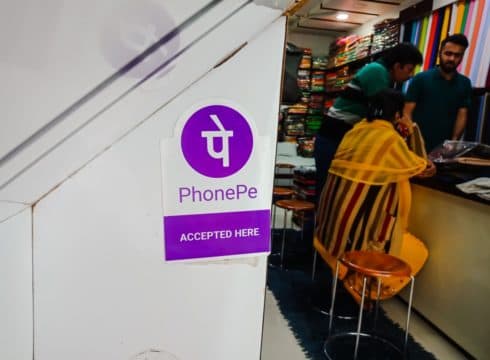PhonePe has alleged that Ventureast and Affle deliberately sabotaged its deal to acquire Indus OS
PhonePe was said to be finalising a $60 Mn acquisition of Indus OS
Affle Global countered that it has invested over $20 Mn in Indus OS and owns a 20% stake
Inc42 Daily Brief
Stay Ahead With Daily News & Analysis on India’s Tech & Startup Economy
Walmart-owned digital payments platform PhonePe has taken its case against early-stage venture fund Ventureast and tech company Affle Global to the Securities and Exchange Board of India (SEBI) over the potential acquisition of software maker Indus OS, in which Ventureast and Affle are investors.
PhonePe was said to be finalising a $60 Mn acquisition of Indus OS, which operates a content and app discovery platform, but it ran into trouble after existing investor Affle objected to the deal. The Singapore-based NSE-listed is a minority shareholder in IndusOS.
But PhonePe claims that another IndusOS investor Ventureast sold its holding to Affle, giving Affle nearly 23% stake in Indus, even while the terms were already agreed for acquisition by PhonePe. Indus OS was founded in 2015 by Rakesh Deshmukh, Akash Dongre and Sudhir Bangarambandi.
Earlier this month, Affle filed a petition against the payments company’s bid for the content discovery platform in the Singapore Court. In response, Indus OS. led by its founders also filed a counter-complaint against Affle Global. The founders are more keen on a deal with the Walmart-owned company, according to earlier reports.
In its complaint to SEBI, PhonePe is reported to have said that Ventureast acted in bad faith and “deliberately” did “side dealings” with Affle to sabotage PhonePe’s acquisition of Indus OS.
“As founders, we are always held to the highest standards of legal and ethical integrity by our investors,” PhonePe cofounder Sameer Nigam said in a statement. “But these standards should apply to investors in startups too. I believe in this case, VPF (Ventureast Proactive Fund-II) has not only broken Sebi’s code of conduct, but it has also acted in complete negligence of its fiduciary duties as a large shareholder of Indus OS. By deliberately derailing PhonePe’s acquisition of Indus OS, a deal which all three OS Labs founders continue to also believe is in their company’s best long-term interests, VPF has also hurt OS Labs’ long term interests,” he added.
Further, Nigam said PhonePe has a very strong case and hoped that the company’s actions would “create a strong deterrent against bad actors trying to bully young startups”.
There are other complications in terms of the shareholding and the valuation of Indus OS. Its founders had said earlier that the term sheet to sell a significant majority in the company to PhonePe was already signed with board member approval. PhonePe would end up acquiring over 90% of Indus OS with two board seats. The payments company is said to have acquired over 30% in the company from earlier investors like Omidyar Network, JSW Ventures and others.
But Affle Global countered that it has invested over $20 Mn in Indus OS so far and owns a 20% stake. The tech company values the startup at $90 Mn, whereas PhonePe is said to have acquired over 90% of Indus OS for $60 Mn.
In July 2020, Affle signed an agreement to acquire 8% of Indus OS for a deal that was said to be worth $2.86 Mn. Indus OS also raised a $5.75 Mn investment from South Korean electronics manufacturer Samsung’s venture fund last year in exchange for a 20% stake, so it is unclear exactly what the shareholding is.
The interest for Indus OS comes largely because of its app distribution prowess. It is said to have over 100 Mn users and with over 4 lakh apps on the marketplace called App Bazaar. The company also has partnerships for pre-installed app stores on 12 smartphone brands as well as Samsung’s default app store the Galaxy Store.
The platform claims to have seen over a billion app installs since 2019. PhonePe is likely to use the network for its in-app mini app store feature called PhonePe Switch. PhonePe Switch is similar to the Google Pay Spots or Paytm Mini Apps, both of which also offer third-party integrations.
Despite its massive scale, Indus OS hasn’t been able to turn a profit, as evidenced in the financial performance for the fiscal year 2020 (FY20) ending March 31, 2020. According to Indus OS’ filings, accessed by Inc42, the company’s revenue for FY20 stood at INR 17.13 Cr, a 360% increase from last year’s revenue of INR 3.72 Cr. But at the same time, Indus OS’ expenses stood at INR 37.32 Cr, an increase of 88% from 2019’s INR 19.87 Cr. Thus, in FY20, the company recorded an after-tax loss of INR 20.19 Cr, a 123% increase from last year’s loss of INR 9.06 Cr.
{{#name}}{{name}}{{/name}}{{^name}}-{{/name}}
{{#description}}{{description}}...{{/description}}{{^description}}-{{/description}}
Note: We at Inc42 take our ethics very seriously. More information about it can be found here.


